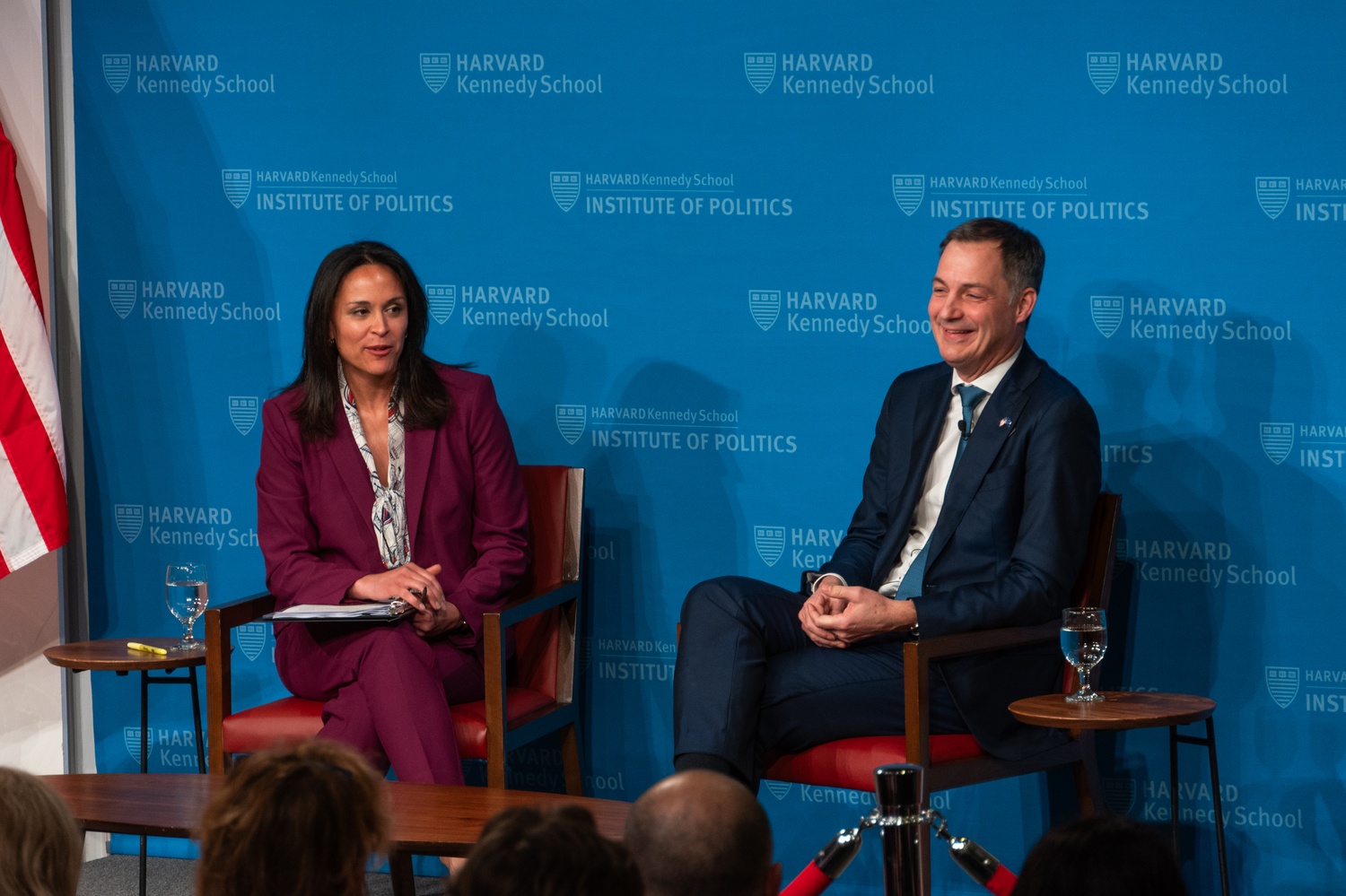
News
When Professors Speak Out, Some Students Stay Quiet. Can Harvard Keep Everyone Talking?

News
Allston Residents, Elected Officials Ask for More Benefits from Harvard’s 10-Year Plan

News
Nobel Laureate Claudia Goldin Warns of Federal Data Misuse at IOP Forum

News
Woman Rescued from Freezing Charles River, Transported to Hospital with Serious Injuries

News
Harvard Researchers Develop New Technology to Map Neural Connections
Belgian Prime Minister Says U.S. Economic Relationship Is Strong In “Unpredictable” Environment

Despite Donald Trump’s tumultuous return to the presidency, Belgian Prime Minister Alexander De Croo said that Europe’s economic relationship with the United States is “rock solid” at a Harvard Institute of Politics forum Friday evening.
“Political rhetoric and those political changes of directions, they’re there, but the economic fundamentals are way, way stronger than that,” De Croo said. “This is our insurance against political capriciousness.”
The event, co-sponsored by the Harvard Kennedy School European Conference, may have been De Croo’s last public appearance as prime minister. Just before taking the stage, his successor announced a new five-party governing coalition concluding seven months of negotiations.
This development, although sudden, was not unexpected. De Croo’s liberal party suffered a crushing defeat in Belgium’s June elections, and he remained on as prime minister in a caretaker role. Now, with the newly-established coalition pending official approval, De Croo has a matter of days left as prime minister.
“I have a good reason to have a few beers tonight,” De Croo said.
De Croo took advantage of the spotlight to offer a broad framework for transatlantic collaboration in his address.
While he acknowledged that the current relationship is “transactional,” De Croo said Europe and the U.S. could link their economic and geopolitical goals to maximize each nation’s interests.
“That is a way cheaper solution than ending up in a trade war,” De Croo said. “Because if we end up in a trade war, everyone is paying and one side of the world is laughing — and that's China.”
De Croo added that the “transatlantic relationship” must go beyond shared economic policies and be reflected in the democratic values which have historically united Europe and the U.S. – a goal complicated by the Trump administration.
“When we talk about Ukraine, we say Russia needs to respect the integrity of a country. I hope that that argument also applies when we talk about the big, icy island to the northeast of here,” De Croo said, referring to Trump’s attempts to take control of Greenland.
“That’s exactly the same argument,” he added.
As leadership from the European Commission and the European Council have yet to comment on Trump’s attempts to annex Greenland, De Croo said the region cannot inconsistently apply their democratic values.
“There’s also a risk — in my view, quite a big risk — that the United States and Europe are being seen as unpredictable, are being seen as unreliable, and are being seen as parts of the world that use different standards depending on which problem they are looking for,” De Croo said.
In the uncertain diplomatic environment, De Croo emphasized that European countries must take action to reassert their positions as economic powerhouses. He focused on the need to create a unified common capital market, consolidate defense systems, and cut red tape and excessive regulation.
“One could say that the alarm clock was ringing, and all the time we snoozed it,” De Croo said. “I think now we’re at the point where we cannot snooze it anymore. We know that we’re under quite a lot of attention. So as Europeans, we need to act.”
Addressing issues of coordination is especially critical, De Croo said, given the likelihood of European Union expansion, from its current 27 member-states, to include countries like Ukraine and the Western Balkans.
“I’m convinced that at some point we will be 35,” De Croo said. “But honestly, before we get bigger, we need to get better.”
In order to reestablish European competitiveness, De Croo says the region must undergo a broader mindset shift to regain “belief in progress.”
“We have a tendency to always be reactive and put ourselves at No. 2,” De Croo said. “We’re the No. 1 investor in innovation, and the No. 1 investor in diplomacy. It’s about time we start acting as a No. 1.”
—Staff writer Elise A. Spenner can be reached at elise.spenner@thecrimson.com. Follow her on X at @EliseSpenner.
Want to keep up with breaking news? Subscribe to our email newsletter.
